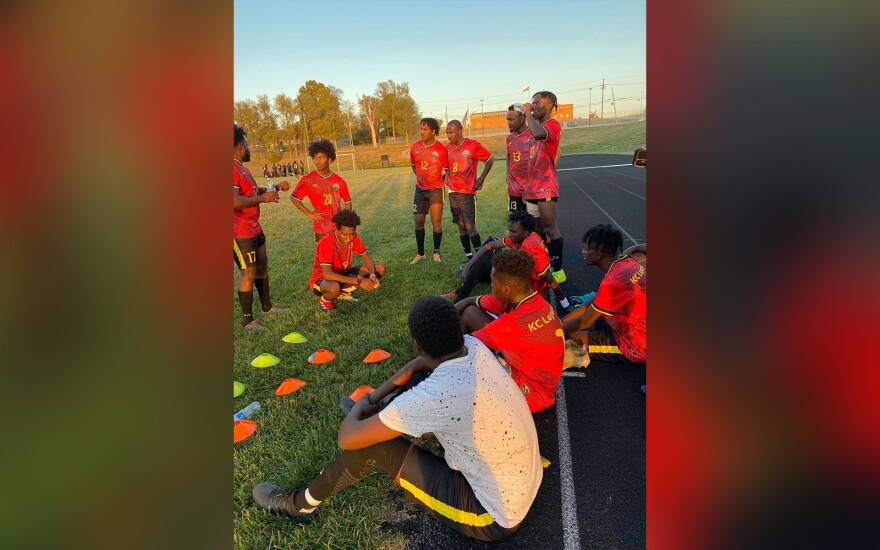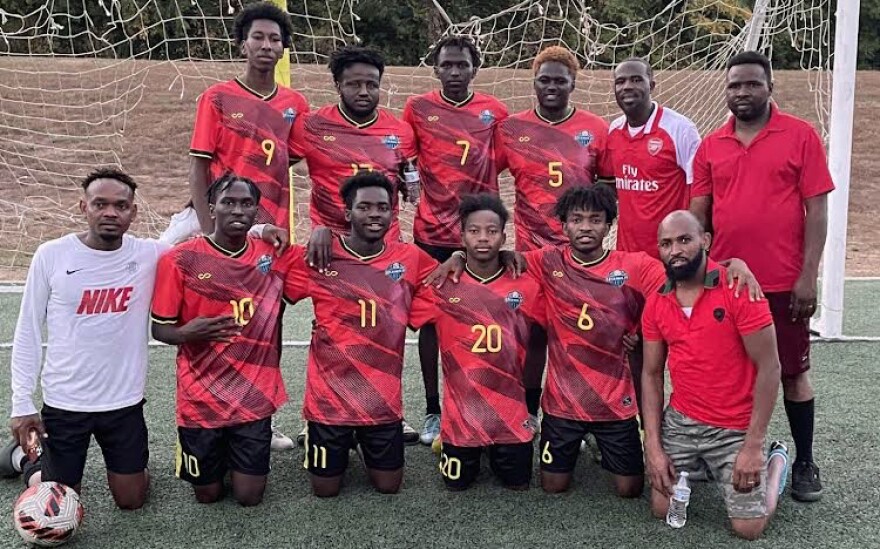When a 13-year-old Ugandan immigrant died in a Kansas City, Kansas, pool two years ago, Abraham Atu knew it was time for someone to step up to help save kids in his community.
“They convinced him to jump a fence to go swimming,” said Atu about Emmanuel Solomon, who drowned in 2021 after sneaking into Parkwood Pool with some friends after hours.
“They went into the deep end and I guess they left him,” said Atu, who’s from a small ethnic group in Eritrea called Kunama.
“It was really tragic and I was shocked,” he said.
Atu took Solomon’s drowning as a symptom of a bigger issue, he said: Kids in his community of African immigrants don’t have many safe options for after-school activities.
“He was one of the kids that started an indoor (soccer) team with my cousin,” he said. After Solomon’s death, the small team he organized to play at Soccer Nation was forced to dissolve.
So, the 22-year-old Atu took up the mantle. He’s now using the same game he learned in Ethiopian refugee camps as a way to keep Kunama, and other immigrant youth, in Kansas City, Kansas, out of trouble.
“There are people trying to influence these kids to join gangs,” said Atu, a Wyandotte High School graduate and psychology major at Kansas Christian College in Overland Park. “It's just messing up their life and when they start, it's going to be hard to get out.”Soccer connecting communities
The KC Legends Kumana Soccer team Atu organized has players ranging from 15 years old to their mid-20s.
Amaren Longen, a 16-year-old the team calls “Rueben,” plays left wing, and belongs to a family of Eritrean immigrants. He said he was heading down the wrong path.
“After school, we were going to different neighborhoods doing bad stuff like smoking or drinking,” Longen said. “But when (Atu) started the team it just showed us that we had people that care for us, and he was just leading us the right way.”
The Wyandotte High School junior said the team’s mentorship and community has also helped him focus more on his education.
Atu’s care has even drawn the attention of other Kunama communities in the region. He said families from as far as St. Joseph, Missouri, make the 50-minute trip two or three times a week in order to join practice.

“We even go and pick them up sometimes to play and to have fun,” Atu said. “The community isn't big, about 20 families or so, so we're working on everything to support each other.”
As the team grows, KC Legends has found itself in need of money for equipment, uniforms and travel fees for tournaments.
Atu is using a new crowdfunding site called AngeLink to raise funds.
Gerry Poirier, the CEO of AngeLink, recently provided a match for the KC Legends fundraising, through the AngeLink Community Foundation. It brought their fundraising total to $250 so far, out of a goal of $3,500.
“Every single one of those boys on that team needs some help, and we're here for them.” Poirier says. “They inspire me. Look what these kids are doing to try and help their community.”Preserving history and heritage
The team is currently practicing for a soccer tournament in August that’s part of the Kunama Cultural Festival 2023, in Sioux Falls, South Dakota. The city of about 200,000 people has the largest Kunama population in the U.S., and soccer teams come from Phoenix, Atlanta, Canada, and elsewhere to compete, and celebrate Kunama history and culture.
"Seeing everyone put on our native clothing and perform cultural dances makes us feel like we are one step closer to home," Atu said. "It makes me want to cry because it reminds me of how peaceful it used to be before the wars and governmental repression."
Moses Idris is the organizer of the Sioux Falls tournament, and has been a soccer coach in that community since he left a refugee camp in Ethiopia 10 years ago.
Idris has been a mentor to Atu for the past couple of years, and says Atu’s leadership in the Kunama community took him by surprise.

“I've just been encouraging him to stick to his passion and to do what he's called to do. I’m glad he's following that,” Idris said. “I'm hoping that he'll have more support in his city to do what he is capable of and more.”
Atu said his team is determined to make it to the tournament, even if they don't meet their fundraising goals.
“Some of the older guys will be working overtime just to save enough for the kids, so we could pay for their trips,” he said. “I think this would help these kids realize that there are people in their lives that want to help them and show them that they're not forgotten.”






